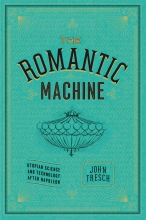John Tresch Wins Top Book Award from HSS

Associate Professor of the History and Sociology of Science John Tresch has received the 2013 Pfizer Prize for Best Scholarly Book from the History of Science Society (HSS) for The Romantic Machine: Utopian Science and Technology after Napoleon. The Pfizer Prize recognizes an outstanding book in the history of science and is the highest honor awarded by the HSS for a single work of scholarship.
In his book, Tresch describes machines such as the compound steam engine and the daguerreotype as “romantic machines,” contrasting them with “classical machines” like mechanical clocks and levers. These new types of machines became embedded in the esthetic, spiritual, and political values of early nineteenth-century Paris. While machines reinforced the inequities of the new industrial order, they also represented a promise of liberation from labor and want.
“Romantic Machine is as imaginative and provocative as the works of the scientists and philosophers that make up its raw materials,” wrote the prize committee. “It is also a model of historical writing: clearly structured, clearly written, and synthetic, it enfolds texts, images, and contexts with masterful ease. It is a pleasure to read a book that is not only transformative, but inspirational.”
Tresch studies the cultural history of science, focusing on its interactions with politics, philosophy, technology, religion, and the arts. Particular interests include the impact of media technology, ritual and experience in the technoscience of the past two centuries, relations of science and literature, and the shifting limits of the rational and real. He is currently examining the scientific and mechanical obsessions of Edgar Allan Poe.
The History of Science Society is the world's largest society dedicated to understanding science, technology, medicine, and their interactions with society in historical context. Over 3,000 individual and institutional members across the world support the Society's mission to foster interest in the history of science and its social and cultural relations.
Read about The Romantic Machine here.
Read more about Tresch’s work on Poe here.





